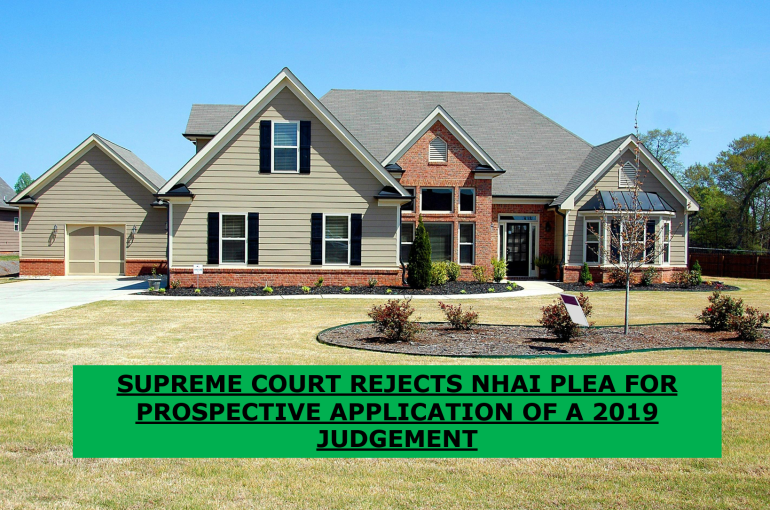SUPREME COURT REJECTS NHAI PLEA FOR PROSPECTIVE APPLICATION OF A 2019 JUDGEMENT
A two Judge Bench of the Hon’ble Supreme Court comprising of Justice Surya Kant and Justice Ujjal Bhuyan passed a judgement dated 04.02.2025 in Union of India & Anr. v. Tarsem Singh & Ors Civil Appeal No. 7064/2019 wherein the Bench held that judgements which have attained finality cannot be set aside by a so-called clarification application which is a review petition in disguise.
Facts
The National Highways Authority of India (NHAI), through its Project Director, filed the Miscellaneous Application before the Apex Court to clarify the ruling in Union of India & Anr. v. Tarsem Singh & Ors (Civil Appeal No. 7064 of 2019) to the extent that it prohibits the reopening of cases where land acquisition proceedings have already been finished and the determination of compensation has also reached finality. The 2019 judgment had declared Section 3J of the National Highways Act, 1956 (NHAI Act) (Land Acquisition Act of 1894 not to apply) as unconstitutional, allowing landowners to claim solatium and interest as part of compensation for land acquisitions by NHAI. This led to multiple appeals by NHAI against various High Court decisions granting these benefits to the landowners.
The Miscellaneous Application was linked to other appeals that the NHAI filed contesting the rulings of different High Courts at private parties’ request, whereupon relief was awarded based on the aforementioned ruling.
The former Land Acquisition Act 1894 made it easier for the Government to acquire land for public uses. The National Highways Laws (Amendment) Act, 1997 (1997 Amendment) added Section 3J and a number of other measures to the NHAI Act. Section 3J did not envisage payment of either ‘solatium’ or ‘interest’ to the landowners.
After its enactment and implementation, multiple High Courts declared Section 3J of the NHAI Act unconstitutional, citing its discriminatory treatment of individuals in similar circumstances. Subsequently, the Apex Court passed the Tarsem Singh judgment in 2019, which ruled that Section 3J of the NHAI Act, excluded the application of the Land Acquisition Act of 1894 and thereby depriving landowners of ‘solatium’ and ‘interest,’ and thus violated Article 14 of the Constitution.
Issues
- Whether the 2019 judgment (Tarsem Singh case) should apply only prospectively (from 19.09.2019 onwards) or retrospectively (covering acquisitions made from 1997 to 2015)?
- Whether past land acquisition cases should be reopened for the payment of solatium and interest?
- Whether applying the judgment retrospectively violates financial stability and legal principles such as finality of judgments?
Arguments by the Petitioner
The Tarsem Singh judgment should be applied only from 2019 onwards, as retrospective application would disrupt settled cases. Moreover, reopening past cases violates the doctrine of immutability, which holds that finalized judgments cannot be disturbed.
Retrospective relief would lead to mass litigation and place a financial burden of approximately ₹92.18 crores on the Public Exchequer. The Petitioner also submitted that the past landowners did not challenge the absence of solatium and interest at the time of acquisition, so new claims should be barred by delay and laches.
Arguments by the Respondent (Landowners)
The counsel for the Respondents argued that denying retrospective application would result in discrimination, as landowners in similar cases (pre-1997 and post-2015) have received solatium and interest. Moreover, the Government had already agreed (in previous cases) to extend solatium and interest to all acquisitions from 1997-2015, and now they cannot backtrack from the procedure.
The Respondents also submitted that NHAI has already paid solatium and interest in other cases.
The Respondent also contended that clarification request made by the Petitioner is effectively a review petition in disguise, which is not permissible as per the law.
Decision of the Hon’ble Supreme Court
The purpose of the 2019 ruling (Tarsem Singh case) was to correct an unconstitutional provision i.e. Section 3J of the NHAI Act, which created unequal treatment among landowners. If the ruling is applied prospectively, it would restore the same unfair situation which the judgment meant to eliminate. Retrospective application is necessary to maintain Article 14 (Right to Equality) as two similar landowners should not be treated differently.
The Apex Court held that financial burden argument by the Petitioner was unconvincing because:
- The State’s duty is to compensate fairly for land taken from individuals.
- The burden ultimately falls on paying citizens, not directly on the Government.
- If NHAI has already paid other landowners, denying relief to this group would be unfair.
The Hon’ble Bench held that reopening of cases is not required because only additional compensation (solatium and interest) should be paid to the fresh applicants and which will not violate the doctrine of immutability.
Hence, the Apex Court rejected NHAI’s request and ruled that the 2019 judgment (Tarsem Singh case) applies retrospectively from 1997 to 2015.
NHAI must pay solatium and interest to all affected landowners whose lands were acquired under the NHAI Act between 1997 and 2015,The connected appeals were dismissed, and NHAI was directed to calculate and pay compensation as per the 2019 judgment.
Conclusion
The Hon’ble Supreme Court observed that the attempt to modify the ruling through this clarification application was deemed to be an abuse of process of law, as it indirectly sought to undo a settled judgment by the Apex Court. Further, this judgment reinforces the retrospective application of the Tarsem Singh case, ensuring equal treatment of all landowners affected by NHAI acquisitions between 1997 and 2015. The Supreme Court has firmly rejected the Petition and NHAI’s attempt to evade liability and has reaffirmed the constitutional right to fair compensation.
ARJAV JAIN
ASSOCIATE
THE INDIAN LAWYER & ALLIED SERVICES
Please log on to our YouTube channel, The Indian Lawyer Legal Tips, to learn about various aspects of the law. Our latest video, titled ‘Law on Ancestral Property,’ can be viewed at the link below:





































Leave a Reply